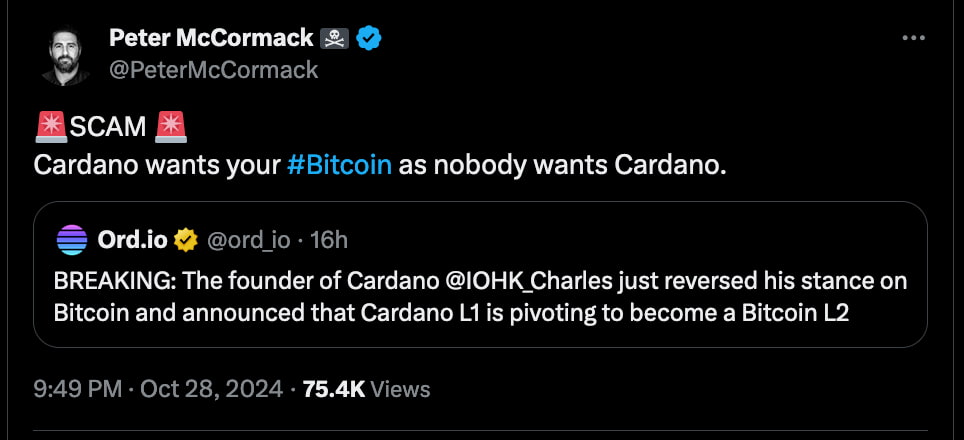Bitcoin influencer calls Cardano’s BTC L2 solution a scam — Is it really? 
![]() Cryptocurrency Oct 29, 2024 Share
Cryptocurrency Oct 29, 2024 Share
A Bitcoin-focused company, BitcoinOS, recently launched a development that can theoretically bridge Bitcoin (BTC) to Cardano (ADA) and other blockchains. A faction of the Bitcoin community, however, is skeptical of the solution, going as far as calling it a “scam.” Finbold reported about it last week to understand how Cardano can tap Bitcoin’s $1.3 trillion liquidity as an L2.
In particular, the Bitcoin influencer and podcast host Peter McCormack shared a related post, sounding “SCAM” alarms. He warned his over 500,000 followers, “Cardano wants your Bitcoin as nobody wants Cardano,” calling the project a scam.
Despite receiving dozens of informative comments from the Cardano community and other commentators, the Bitcoin influencer has kept his stance. As of this writing, McCormack’s post has received over 75,000 views in less than 12 hours of posting.
Picks for you
Bybit brings its Bybit Card to new regions 7 mins ago Here’s why Bitcoin miner stocks are soaring 47 mins ago If you invested $1,000 in Gold at the start of 2024, you'd now have this much 1 hour ago Transak sees 300% month-over-month growth in Sui Wallet 1 hour ago  Peter McCormack: “SCAM – Cardano wants your Bitcoin (…)” post. Source: X / Finbold
Peter McCormack: “SCAM – Cardano wants your Bitcoin (…)” post. Source: X / Finbold
Interestingly, McCormack’s shared post from Ord.io’s official account said Cardano’s founder Charles Hoskinson “reversed his stance on Bitcoin and announced that Cardano L1 is pivoting to become a Bitcoin L2,” which never happened. In an X community note, the claim is deemed a “confusion.”
“Cardano Is not pivoting to be an L2. Cardano will still operate as a Layer 1, maintaining its own consensus and separate validator set. The confusion is likely due to a recently announced two-way bridge with bitcoin.”
– X Community Notes
Is Cardano’s BTC L2 solution via BitcoinOS a scam?
So far, there is no compelling evidence that this recent Cardano-Bitcoin implementation is a “scam,” although it has risks. Looking for further insights, Finbold turned to OpenAI’s most advanced artificial intelligence model, o1, to review and analyze the whitepaper. The full response was shared in video and text format in a post on October 29, on X.
That's a terrible take from @PeterMcCormack.
I don't hold any $ADA, and I don't even like Cardano much, but this post is highly misleading and the fruit of misinformation. Peter should do his research better.
This Cardano<>Bitcoin implementation is apparently far more secure… https://t.co/qmykwsrcMr pic.twitter.com/p6sBRpx3eq
— Vini Barbosa (@vinibarbosabr) October 29, 2024
In summary, the PhD-like AI believes healthy skepticism is beneficial, but innovation requires open-mindedness and a balanced approach. OpenAI’s o1 explained how the technology works, its risks, benefits, trade-offs, and vulnerabilities to consider – including requiring further battle-tests.
“The BitcoinOS whitepaper introduces a significant advancement in enabling trustless and secure interoperability between Bitcoin and other blockchain networks. By optimizing for zk-SNARK verification through BitSNARK and implementing the Grail bridge, it aims to address long-standing scalability and functionality limitations. While promising, it is crucial to approach this innovation with careful scrutiny, thorough testing, and a commitment to security best practices. Users and stakeholders should remain informed, participate in community discussions, and contribute to the development and auditing processes to ensure the system’s robustness and integrity.”
– OpenAI’s o1
 OpenAI’s analysis on BitcoinOS: Cardano’s Bitcoin L2 solution. Source: NanoGPT / Finbold
OpenAI’s analysis on BitcoinOS: Cardano’s Bitcoin L2 solution. Source: NanoGPT / Finbold
Moreover, o1 traced comparisons with other popular Bitcoin layer-2 (L2) solutions often promoted by the self-called “Bitcoin toxic maximalists,” a group that proudly considers everything that is not Bitcoin a “scam.” The AI addressed the trade-offs of Cardano’s BTC L2 solution against Blockstream’s federated Liquid Network or the Lightning Network, often promoted by Peter McCormack.
There’s nothing like watching someone see the power of #bitcoin’s Lightning Network live. https://t.co/Vavd18uKIg pic.twitter.com/Nh3qktxPhb
— Peter McCormack 🏴☠️ (@PeterMcCormack) September 13, 2023
All things considered, while there is no evidence that this is a “scam,” users should be aware of the risks. BitcoinOS’s solution is new and still in development, just recently going through public tests. Therefore, anyone interested in using it should do so only after proper research and applying risk-mitigation strategies.
Featured image:
Ken Stocker – October 29, 2024. Digital Image. Shutterstock.